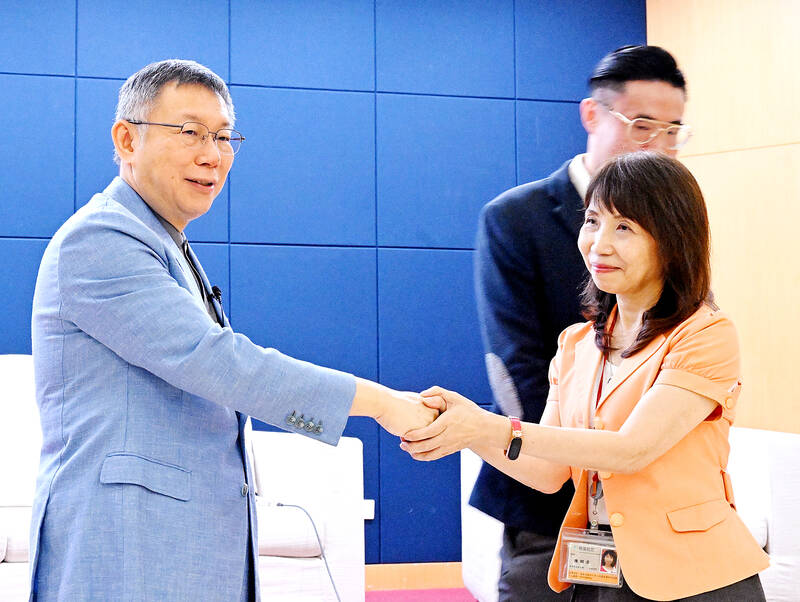Taiwan People’s Party (TPP) Chairman and presidential candidate Ko Wen-je (柯文哲) yesterday said he would seek to “gauge public opinion” on assisted suicide and surrogacy, despite “personally” supporting legalization.
At a news conference in Taipei, Ko said that he “could not think of any reasons to oppose” legalizing the two practices based on his experiences as a medical professional, which include serving as director of the National Taiwan University Hospital emergency room and the hospital’s Department of Traumatology.
Asked by reporters if this meant the legalization of euthanasia and surrogacy — pregnancy by artificial insemination and carrying another person’s baby — was a part of his election platform, Ko stopped short of officially endorsing the two policies, stating only that he would seek to “gauge public opinion.”

Photo: Chu Pei-hsiung, Taipei Times
When pressed further on the issue — and opposition from religious and human rights groups, in particular — Ko said legalization would be his “direction,” adding that he would “try to persuade the opponents” of euthanasia and surrogacy.
Chen Chao-tzu (陳昭姿), a former head of the pro-independence Taiwan Society and long-time advocate of surrogacy, told the news conference she had been pushing for the legislation of surrogacy since 1996.
The surrogacy advocate claimed that a clique in the Democratic Progressive Party’s (DPP) Department of Gender Equality had continually blocked bills to legalize the practice, resulting in reform languishing in the legislature for almost 30 years.
Chen said that this small group of self-appointed “feminists” opposes surrogacy to use women as “tools.”
Surrogacy has also met with the objection of children welfare advocacy groups that champion adoption, Chen added.
Chen asked why the government encourages couples to have children amid the country’s low birthrate, but has ignored couples who would do anything to have their own children through surrogacy.
In 2004, Premier Chen Chien-jen (陳建仁), then-health minister, held the first-ever “civic conference” in Taiwan to discuss surrogacy and arrived at the consensus to “not prohibit surrogacy, but only permit it with conditions,” Chen Chao-tzu said.
Chen Chien-jen told her then that she could “expect progress” in six months, a promise that has to date been unfulfilled, she said, calling on Chen Chien-jen to launch a new initiative to legalize surrogacy in his more prominent role as premier.
Chen Chao-tzu told Ko that she would support Ko in the presidential election as long as Ko would include legalizing surrogacy as a component of his healthcare platform.
When reporters asked Ko whether Chen Chao-tzu’s appearance at his news conference meant she had “ditched” Vice President William Lai (賴清德), the DPP’s presidential candidate, in favor of himself, Ko said that people should not jump to conclusions and that there was no need to “politicize everything.”
Ko said that he and Chen Chao-tzu had known each other for many years and that she recruited him to be the convener of former president Chen Shui-bian’s (陳水扁) medical team, for which Chen Chao-tzu was the spokesperson.
It was due to this experience that he had the opportunity to campaign for and be elected Taipei mayor, Ko said.

Chinese spouse and influencer Guan Guan’s (關關) residency permit has been revoked for repeatedly posting pro-China videos that threaten national security, the National Immigration Agency confirmed today. Guan Guan has said many controversial statements in her videos posted to Douyin (抖音), including “the red flag will soon be painted all over Taiwan” and “Taiwan is an inseparable part of China,” and expressing hope for expedited reunification. The agency last year received multiple reports alleging that Guan Guan had advocated for armed reunification. After verifying the reports, the agency last month issued a notice requiring her to appear and explain her actions. Guan

GIVE AND TAKE: Blood demand continues to rise each year, while fewer young donors are available due to the nation’s falling birthrate, a doctor said Blood donors can redeem points earned from donations to obtain limited edition Formosan black bear travel mugs, the Kaohsiung Blood Center said yesterday, as it announced a goal of stocking 20,000 units of blood prior to the Lunar New Year. The last month of the lunar year is National Blood Donation Month, when local centers seek to stockpile blood for use during the Lunar New Year holiday. The blood demand in southern Taiwan — including Tainan and Kaohsiung, as well as Chiayi, Pingtung, Penghu and Taitung counties — is about 2,000 units per day, the center said. The donation campaign aims to boost

The Kaohsiung Tourism Bureau audited six hotels in an effort to prevent price gouging ahead of Korean band BTS’ concert tour in the city scheduled for Nov. 19, 21 and 22 this year. The bureau on Friday said that the audits — conducted in response to allegations of unfair pricing posted on social media — found no wrongdoing. These establishments included the local branches of Chateau de Chine, Hotel Nikko, My Humble House, and Grand Hai Lai, it said, adding that the Consumer Protection Commission would have penalized price gougers had the accusations been substantiated. The bureau said the Tourism Development Act

BACK TO WINTER: A strong continental cold air mass would move south on Tuesday next week, bringing colder temperatures to northern and central Taiwan A tropical depression east of the Philippines could soon be upgraded to be the first tropical storm of this year, the Central Weather Administration (CWA) said yesterday, adding that the next cold air mass is forecast to arrive on Monday next week. CWA forecaster Cheng Jie-ren (鄭傑仁) said the first tropical depression of this year is over waters east of the Philippines, about 1,867km southeast of Oluanpi (鵝鑾鼻), and could strengthen into Tropical Storm Nokaen by early today. The system is moving slowly from northwest to north, and is expected to remain east of the Philippines with little chance of affecting Taiwan,